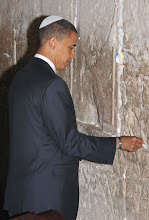 Myth: “The resolutions of the recent Fatah [Congress] speak of using violence, [taking] all of Jerusalem, an absolute right of return…The Fatah platform…has buried any chance of coming to an agreement with the Palestinians in the next few years…” - Israeli Foreign Minister Avigdor Lieberman
Myth: “The resolutions of the recent Fatah [Congress] speak of using violence, [taking] all of Jerusalem, an absolute right of return…The Fatah platform…has buried any chance of coming to an agreement with the Palestinians in the next few years…” - Israeli Foreign Minister Avigdor Lieberman
“Fatah has once again left the door open for terrorism…It used classic language justifying violence against civilians – ‘Fatah adopts all legitimate forms of struggle with clinging to the option of peace.’…Another unaccountable resolution stated a refusal to negotiate with Israel until it ceded all of Jerusalem to the Palestinians.” - Abraham Foxman, National Director, Anti-Defamation League
The Facts – In Brief:
- Fatah renewed its commitment to negotiating peace with Israel based on a two-state solution and the Arab Peace Initiative.
- The Arab Peace Initiative does not call for a right of refugee return to Israel but rather for an agreed solution to the refugee problem.
- The Fatah platform also called for nonviolent forms of resistance to support negotiations with Israel, or in the event that the negotiations are unsuccessful. It endorses “resistance by all legitimate means,” leaving out the option of armed struggle. Palestinian President Mahmoud Abbas made his position very clear: “We must not stain our legitimate struggle with terror.”
- The Arabic text of his speech confirmed that he referred to East Jerusalem, not to "all of Jerusalem."
More Facts:
1. Former Knesset Member and Israeli Diplomat Colette Avital: “[T]he deeply-seated mistrust, the habit of reading first and foremost the bad elements in any Palestinian document, makes it easy to misinterpret some of the resolutions negatively. Thus, for days our media reported that the Palestinians were not ready to give up on violence and that the resolutions called for the continuation of armed struggle as a strategy. The truth is that the Bethlehem platform calls for 'resistance by all legitimate means,' and leaves out the option of armed struggle. When reading a political document, as some of us have been taught, it is important to read every word in its context, but also to consider what has been left out.
"Abbas himself made his position very clear: 'We must not stain our legitimate struggle with terror,' he said.
"On Jerusalem, too, our media hurried to report that Abbas had demanded sovereignty over all of Jerusalem. Yet reading the text in Arabic, one discovers that the expression used by Abu Mazen refers to east Jerusalem, commonly referred to as the 'Arab side.' To make this even clearer, the call on Israel to return to the 1967 borders is an implicit recognition of Israel's sovereignty over west Jerusalem.
"The congress also endorsed the 2002 Arab [peace] initiative. Interestingly, but not known to every one, the initiative does not call for a right of return of the refugees. Here too, my humble advice to all the skeptics is to read the text as formulated. It clearly states that there should be a 'principled and agreed upon solution' for the refugee problem.
"Finding the dark side of things provides good pretexts to those who refuse progress."
("It's time to talk to Fatah," Colette Avital , The Jerusalem Post, 8/19/09. Avital is Director-General of the Berl Katznelson Center and International Secretary, Israel Labor Party; she is a Former Labor Knesset Member and former Israel Consul General in New York.)
2. Lafer international fellow Mohammad Yaghi of the Washington Institute for Near East Policy (a leading centrist to center-right pro-Israel think-tank) concludes his analysis of the Fatah Sixth Congress which convened in Bethlehem during August, as follows: “Fatah renewed its commitment to achieve a peaceful settlement with Israel through negotiations, a departure from old principles that relied heavily on armed struggle.”
“The congress also sanctioned 'all legitimate forms of struggle while working toward peace and without limiting the option of peaceful negotiations,' noting that among the accepted forms of resistance are 'mobilizing popular resistance against settlements, boycotting Israeli products, escalating an international campaign to boycott Israel, and reactivating Fatah relations with the Israeli peace camp.' The political program makes very clear that armed struggle is not on the table at this time.
"Fatah, however, did not forswear violence as a future option. According to the PLO news agency WAFA, the congress issued a brief statement to this effect: 'While Fatah is clinging to the option of a just peace and is seeking to achieve it, it won't abandon any of its options. Fatah maintains its belief that resistance, in all its forms, is a legitimate right for occupied peoples facing their occupiers.' Some Fatah members immediately downplayed the statement, saying it was added in response to opposition parties that have accused Fatah of abandoning armed struggle.
"Salah Tamari, a member of the Fatah Revolutionary Council and former governor of Bethlehem, agrees: 'All calls for armed struggle are for publicity and election purposes.' Other credible sources commented that 'the calls for armed struggle drew too much giggling from the congress's members.' According to [Nabil] Shaath, although the program maintains the Palestinian right to all forms of resistance, it clearly states that resistance should be used within the boundaries of international law and only when all Palestinian factions approve it.”
(PolicyWatch #1569, Fatah Congress: Will New Resolutions Mean a New Direction?, By Mohammad Yaghi, August 14, 2009)
3. Ha’aretz Editorial: We do have a partner, 8/7/09:
“Fatah's new platform, and chairman Mahmoud Abbas' speech, won sweeping support from the more than 2,200 delegates who came from throughout the Palestinian Diaspora. From Bethlehem, they sent Jerusalem an unequivocal message: The Palestinian national movement's strategic choice is still two states for two peoples.
“Although Fatah's first convention in 20 years was held in the shadow of the Israeli occupation and an impasse in the peace process, the movement committed itself to the diplomatic option and the principles of the Arab peace initiative. Fatah formally distinguished itself from Hamas and joined the Arab and international consensus on a political solution - namely, the establishment of a contiguous Palestinian state on the basis of the June 4, 1967 borders, with East Jerusalem as its capital, and a just solution to the refugee problem by agreement with Israel, on the basis of UN Resolution 194.
“It is only natural for Israel not to accept Fatah's platform, just as the Palestinian leadership objects to Likud's platform. But Fatah's approach to the peace process refutes the right-wing argument that ‘there is no Palestinian peace partner.’”
4. Eric Fingerhut, Jewish Telegraphic Agency, August 11, 2009: “In his speech to the conference…newly re-elected Fatah chairman and Palestinian Authority President Mahmoud Abbas did stress that the Palestinians would focus on 'nonviolent' resistance….
“Nathan Brown, a political science and international affairs professor at George Washington University and an expert in Palestinian reform…said [the Fatah platform] should be viewed as akin to a U.S. political party platform that might contain some ‘red meat language’ to satisfy the political factions in a ‘large and diverse movement’ like Fatah but isn't necessarily followed by the party leaders.
“Brown said what was more important was whether the Fatah leaders elected at the assembly would form a ‘coherent’ organization dedicated to a diplomatic solution and whether they continue to ‘do what the Israelis want them to be doing’ on security and other issues…”
5. Israeli Defense Minister Ehud Barak said that “the rhetoric we hear from the Fatah Congress and the stances taken there are unacceptable to us, but we need to realize that there is no solution for the Middle East but a [peace] agreement. I advise Abu Mazen to enter into serious negotiations with us, and I advise the Americans under the leadership of President Obama to lead a process such as this in the Middle East, including the Palestinians, Syria, and additional countries.” (Ynet, 8/9/09)






